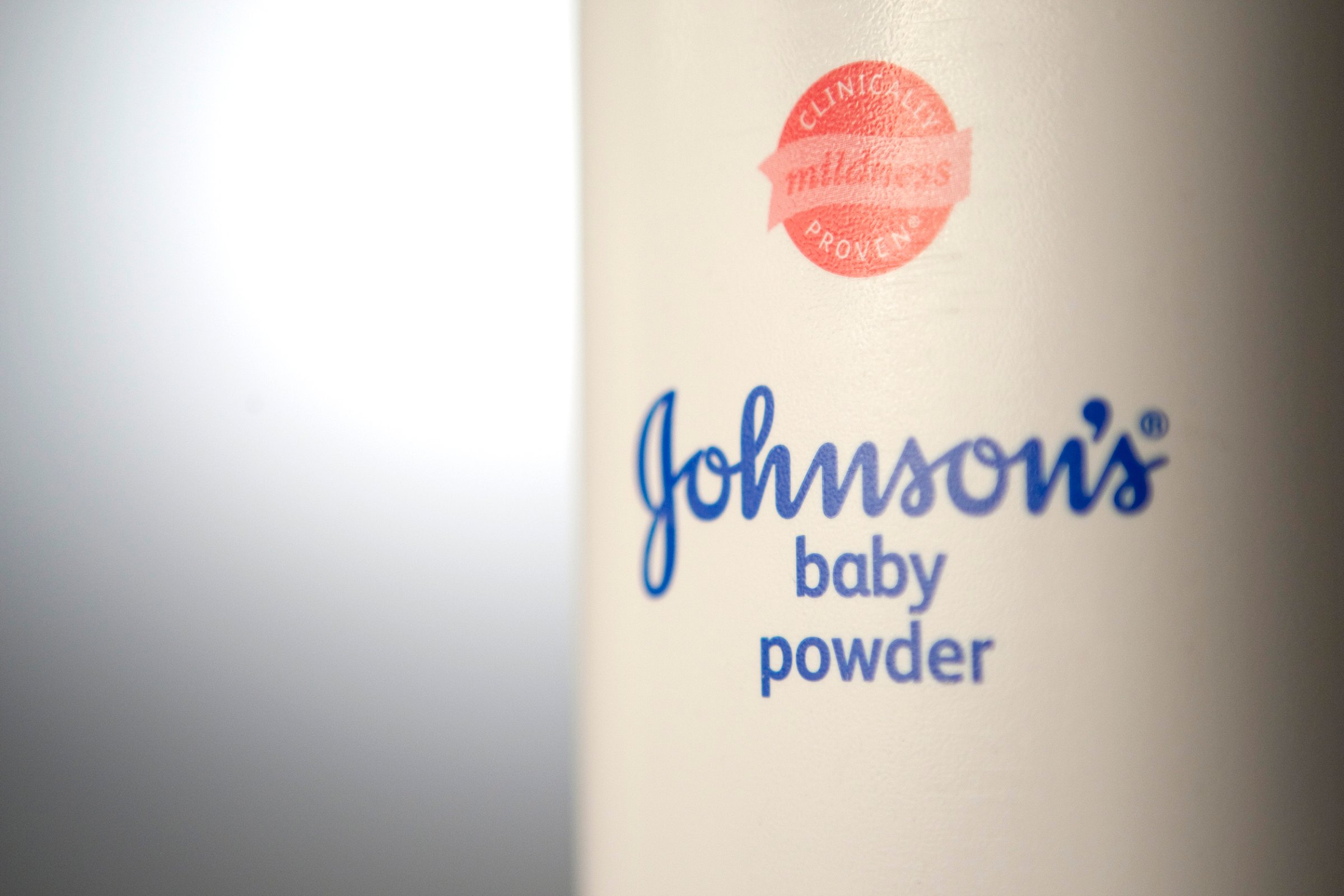
As Bloomberg Businessweek reports, every morning for almost 40 years, Jacqueline Fox sprinkled baby powder into her panties before she put them on. “I was raised up on it,” she later explained in a deposition. “They was to help you stay fresh and clean. … We ladies have to take care of ourselves.” Only after being diagnosed with advanced ovarian cancer in 2013, did she learn talcum powder could be a possible carcinogen.
Fox joined more than 1,000 women suing Johnson & Johnson and Imerys, the talc supplier, for failing to put warnings on talcum-based products despite knowing of potential cancer risks since 1979. According to Bloomberg Businessweek, an internal company memo years ago acknowledged potential cancer links, but it simultaneously recommended more aggressive marketing to African American women. Months after her death in October, Fox—who was African-American—became the first plaintiff to be awarded damages; the jury ordered Johnson & Johnson to pay her family $72 million. Her son wept openly at the verdict.
Like pressing our hair and lotioning our legs, douching and deodorizing vaginas is something black women teach our daughters and sister-friends teach our friends. It’s part of black women’s culture of self-care, one of many ways we love and nurture bodies nobody else seems ready to pamper. When we decide to do something with our bodies, well, we do it. Black women spend about four times as much as white women on hair, and twice as many black women douche and deodorize compared with our white counterparts, according to research by Francesca Branch, Tracey J. Woodruff, Susanna D. Mitro and Ami R. Zota. The researchers found that like baby powder, over-the-counter douches and vaginal deodorizers contain ingredients—namely, phthalates—linked to cancer, among other health risks not listed on labels.
Why do black women work so hard to keep our vaginas from smelling like we ever bleed, orgasm, sweat or eat catfish? In her insightful article “An Odor of Racism: Vaginal Deodorants in African-American Beauty Culture and Advertising,” Michelle Ferranti writes: “For many recently emancipated African Americans, a clean and odor-free body signified personal progress and enterprise, and the hope for racial assimilation.” The first documented reference to douching comes in an 1803 medical manual for the treatment of West Indian slaves, which lists excessive vaginal discharge as a common complaint and prescribes twice-daily douching.
The need to alter enslaved women’s vaginal odor and discharge adds a misogynist twist to pernicious stereotypes of blacks’ “strong and very disagreeable odor,” to quote Thomas Jefferson. If racism posits that blacks reek, and misogyny teaches us that vaginas are rank, how difficult does it become for black women to love the scent of our healthy vaginas?
Johnson & Johnson and other companies are ready to profit from these myths of the excessive black vagina. They’re willing to capitalize on our internalized misogynoir even if we die in the process. For decades, companies, including Johnson & Johnson, continued marketing to encourage black women to spend money on talcum powder, which could cause cancer in our reproductive organs even as they promise to “freshen” them. Because buyers were women, they were the advertisers’ targets; because they were women, they were vulnerable to side effects the companies never exposed.
Last week in my black feminisms course, we discussed the importance of cunnicentrism in black women’s art. Yes, cunnicentrism: aesthetic appreciation for colors (pink, purple), shapes (circles, triangles), and textures (wet, viscous) associated with the vulva and vagina. And, as I added in my lecture, while we can’t see them in visual art, we shouldn’t forget taste and smell. We should all learn to take care of our vaginas every day, and, no, vaginas don’t smell like flowers or baby powder. They smell like a human body, and part of claiming our full humanity is being able to be proud of every aspect of them.
As Fox said: “we ladies need to take care of ourselves.” In light of these recent lawsuits, we need to rethink what “taking care of ourselves” means. For black women, cunnicentrism not only stands to celebrate our bodies; It can save our lives.
—
Bloomberg Businessweek reported that Johnson & Johnson says it will appeal the lawsuit verdict. The publication also reported that, in an e-mail response, a spokeswoman for Johnson & Johnson Consumer said “the overwhelming body of scientific research and clinical evidence supports the safety of cosmetic talc.”
More Must-Reads from TIME
- Inside Elon Musk’s War on Washington
- Meet the 2025 Women of the Year
- Why Do More Young Adults Have Cancer?
- Colman Domingo Leads With Radical Love
- 11 New Books to Read in Februar
- How to Get Better at Doing Things Alone
- Cecily Strong on Goober the Clown
- Column: The Rise of America’s Broligarchy
Contact us at letters@time.com